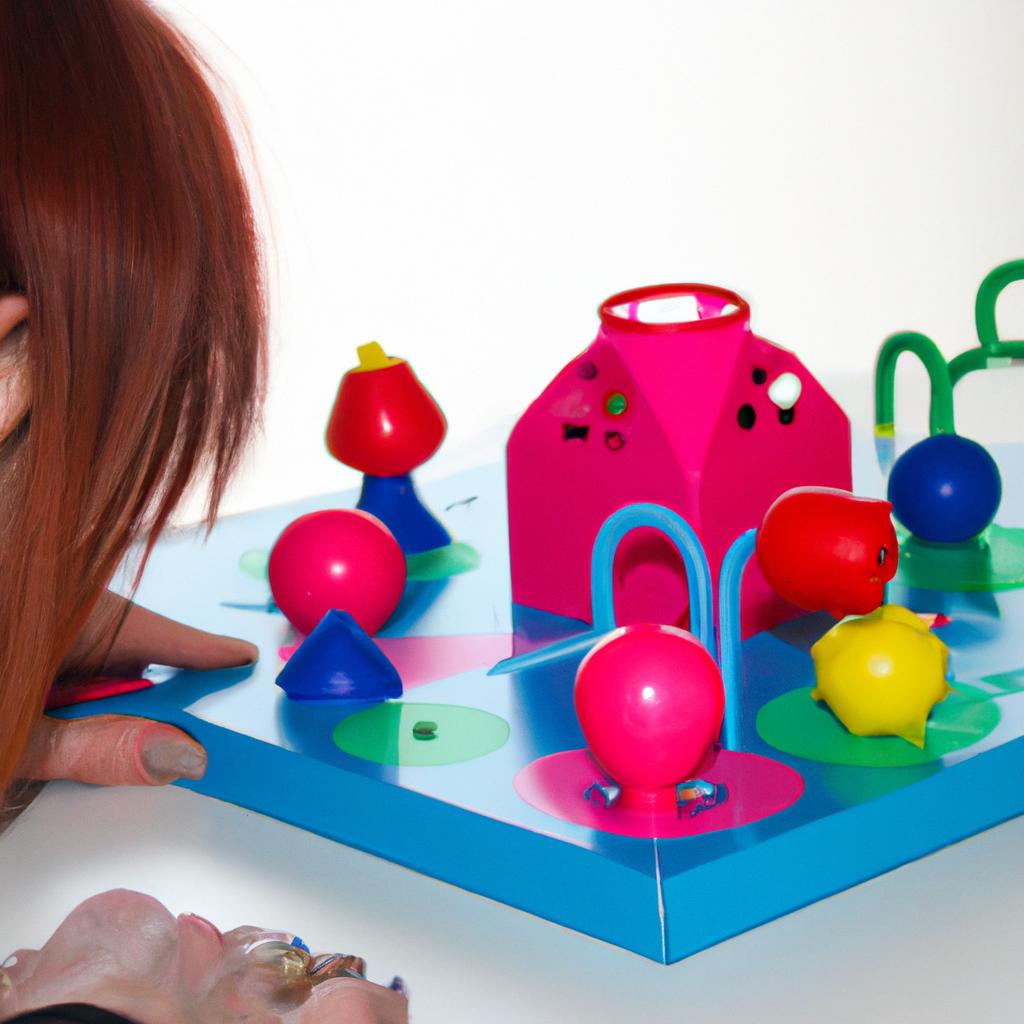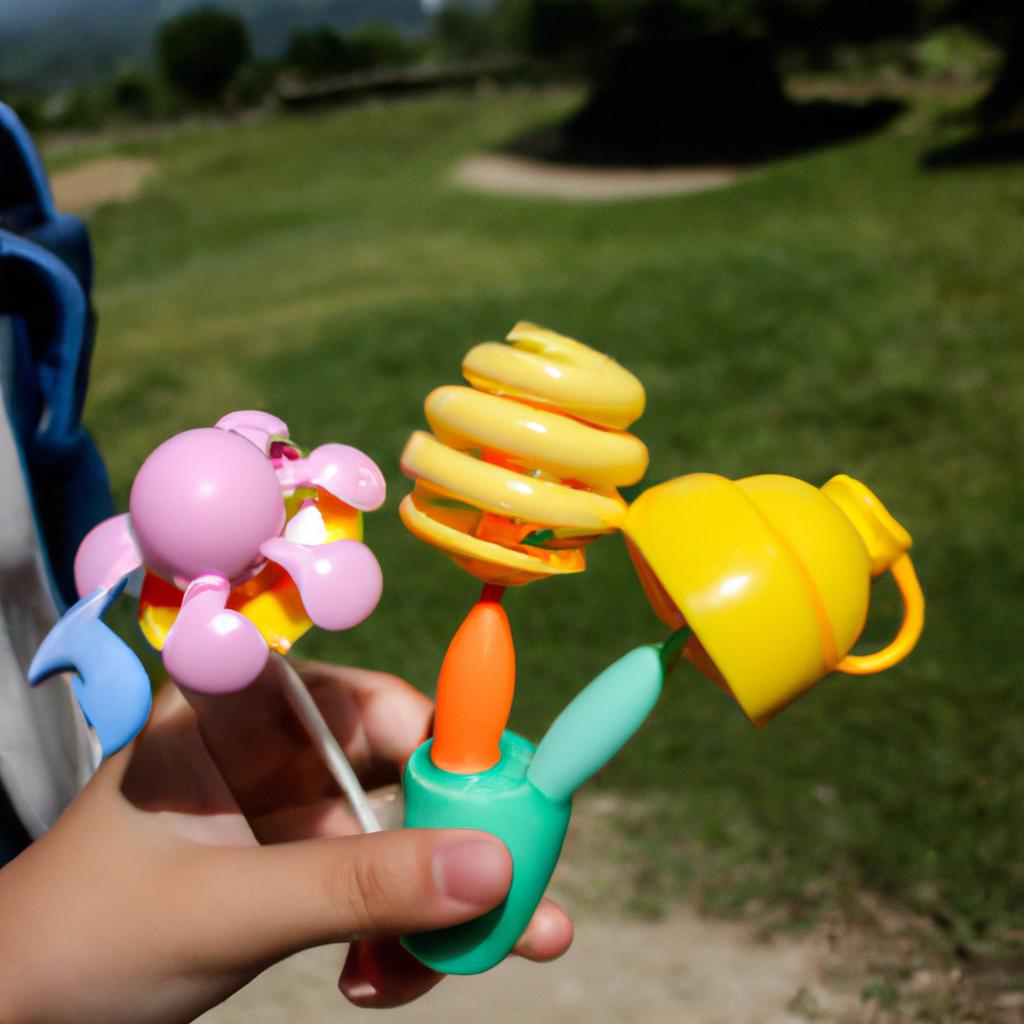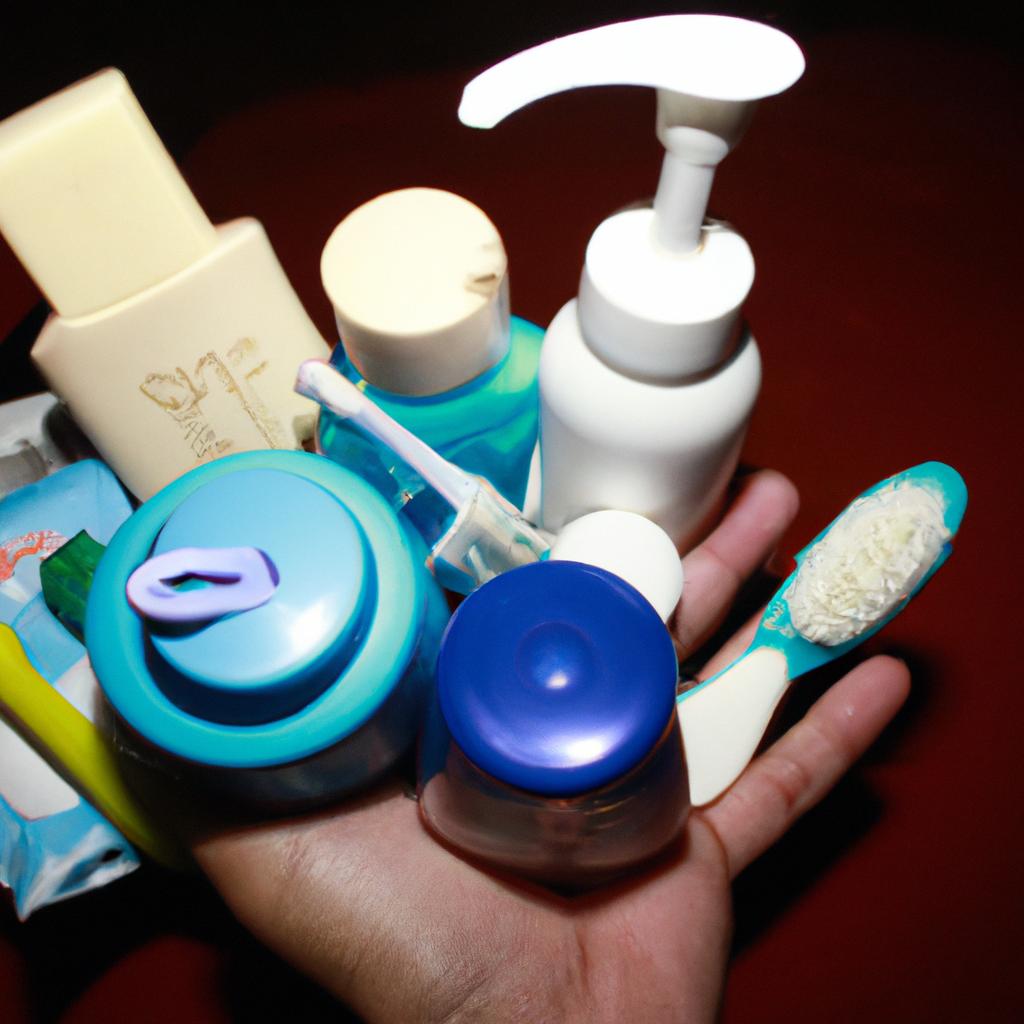The role of educational toys in enhancing children’s learning experiences has long been recognized. With the increasing demand for high-quality educational products, Baby Country Consignments>toys and games has emerged as a leading provider of innovative and engaging toys designed to promote cognitive development among young learners. This article will explore the impact of educational toys on children’s learning outcomes and highlight how Baby Country Consignments>toys and games offers a wide range of educational resources that cater to different age groups.
For instance, consider a hypothetical scenario where a parent purchases an interactive puzzle toy from Baby Country Consignments>toys and games for their three-year-old child. As the child engages with this toy, they are not only entertained but also exposed to various shapes, colors, and patterns. Through hands-on exploration and problem-solving, the child develops critical thinking skills while improving their hand-eye coordination. By offering such educational toys, Baby Country Consignments>toys and games plays a crucial role in supporting early childhood development by providing stimulating learning opportunities at home.
In light of these considerations, it becomes evident that educational toys have the potential to significantly enhance children’s learning experiences. In the following sections, we will delve deeper into the benefits of educational toys provided by Baby Country Consignments>toys and games and explore how they cater to different age groups.
Baby Country Consignments>toys and games offers a wide range of educational toys designed to meet the specific developmental needs of children at different stages of their learning journey. For infants and toddlers, they provide toys that promote sensory development, such as soft books with textured pages or colorful rattles that stimulate their senses. These toys help infants explore their environment, develop fine motor skills, and learn about cause-and-effect relationships.
For preschoolers, Baby Country Consignments>toys and games offers interactive toys that focus on early literacy, numeracy, problem-solving, and creativity. Examples include alphabet puzzles, counting sets, building blocks, and art supplies. These toys engage children in hands-on activities that foster cognitive skills like letter recognition, number sense, spatial awareness, and imaginative thinking.
Furthermore, Baby Country Consignments>toys and games recognizes the importance of STEM (science, technology, engineering, and mathematics) education in today’s rapidly advancing world. To support this area of learning for older children, they offer science kits, coding games, building sets with gears and motors, and logic puzzles. These toys encourage critical thinking abilities while introducing fundamental concepts related to science, engineering principles, logical reasoning, problem-solving strategies.
In addition to catering to various age groups’ developmental needs through their diverse toy selection,Baby Country Consignments>toys and games also ensures the quality and safety of their products. They prioritize selecting toys made from non-toxic materials that are durable enough to withstand the rigors of playtime while adhering to safety standards set by regulatory bodies.
Overall,Baby Country Consignments>toys and games understands the significance of educational toys in promoting children’s learning outcomes across different domains. By offering a wide range of high-quality educational resources tailored to various age groups’ needs,Baby Country Consignments>toys and games empowers parents and caregivers to provide enriching learning experiences for their children at home.
Benefits of Educational Toys for Learning
Imagine a young child named Emily who struggles with counting and basic math skills. Her parents introduce her to an educational toy called “Counting Caterpillar,” which consists of colorful numbered segments that can be connected to form a caterpillar. As Emily plays with the toy, she not only learns to identify numbers but also develops her fine motor skills by manipulating the individual pieces.
Enhanced Cognitive Development:
Educational toys offer numerous benefits when it comes to enhancing learning in children. Firstly, they stimulate cognitive development by providing opportunities for problem-solving and critical thinking. For instance, puzzles and building blocks encourage children to think logically, analyze spatial relationships, and develop their reasoning abilities. These activities engage children’s minds in active exploration, fostering creativity and imagination.
Improved Social Skills:
In addition to promoting cognitive growth, educational toys also play a crucial role in developing social skills. Many educational toys are designed for group play or cooperative tasks, encouraging interaction among peers. This promotes communication and collaboration while teaching children essential interpersonal skills such as sharing, taking turns, and negotiating conflicts effectively.
Emotional Benefits:
Moreover, educational toys have emotional benefits that contribute to overall well-being. They provide a sense of accomplishment when children successfully complete challenges or solve problems independently. This boosts self-esteem and confidence levels, instilling a positive attitude towards learning from an early age.
Table: Emotional Impact of Educational Toys
| Emotional Benefits | Examples |
|---|---|
| Boosted Self-Esteem | Feeling proud after solving challenging puzzles |
| Increased Confidence | Gaining mastery over complex concepts through interactive games |
| Sense of Achievement | Successfully completing construction projects |
| Positive Attitude Towards Learning | Developing curiosity and enthusiasm through hands-on experiences |
Transition into the next section:
As we begin exploring the world of educational toys further, it is important to consider how to choose the right ones for your child. By understanding their interests, abilities, and learning styles, you can make informed decisions that will maximize the benefits of educational toys in their development. So let’s delve into the process of selecting the most suitable educational toys for your child’s unique needs.
Choosing the Right Educational Toys for Your Child
Enhancing Learning through Baby Country Consignments: Choosing the Right Educational Toys for Your Child
Now, let us delve into the process of selecting the right educational toys for your child. To illustrate this further, consider a hypothetical scenario where parents are looking to choose an educational toy for their three-year-old daughter.
When choosing an educational toy, several factors should be taken into account. Firstly, it is important to consider your child’s interests and preferences. In our example scenario, the parents may notice that their daughter has shown a keen interest in building blocks during playtime with her friends. This observation can serve as a starting point in determining what type of educational toy would engage and motivate their child.
Additionally, considering the age appropriateness of the toy is crucial. Different age groups require different levels of complexity and skill-building opportunities. For instance, if our hypothetical child was four years old rather than three, she might benefit from more advanced construction sets or puzzles that challenge her problem-solving abilities.
Moreover, taking into consideration the specific skills you want to foster in your child can guide your decision-making process. Let’s say our example parents aim to enhance their daughter’s fine motor skills while also promoting creativity and imagination. They could opt for a set of magnetic building tiles that allow her to construct various shapes and structures independently.
To summarize, when choosing an educational toy for your child:
- Consider your child’s interests and preferences.
- Take note of age appropriateness.
- Identify specific skills you wish to develop.
By following these guidelines tailored to your child’s individual needs and desires, you can select an educational toy that will not only entertain but also facilitate growth and learning.
| Skill Development | Age Appropriateness | Toy Examples |
|---|---|---|
| Fine Motor Skills | 2-4 years | Building blocks, shape sorters |
| Cognitive Skills | 3-5 years | Puzzles, memory games |
| Language Development | 1-3 years | Picture books, alphabet toys |
| Problem-Solving Skills | 4-6 years | Construction sets, logic puzzles |
By understanding the influence of these toys on cognitive abilities, you will gain further insight into their value and importance in childhood education.
How Educational Toys Improve Cognitive Development
Enhancing Learning through Baby Country Consignments: The Role of Educational Toys in Cognitive Development
Imagine a curious toddler named Emma, who spends hours playing with her educational toys. She eagerly engages with puzzles, building blocks, and shape sorters, all carefully selected by her parents from the diverse range offered at Baby Country Consignments. Through these interactive play experiences, Emma not only hones her problem-solving skills but also enhances her cognitive development.
Educational toys have been recognized as valuable tools for promoting cognitive growth in children. They stimulate various aspects of their mental abilities and foster critical thinking from an early age. Research suggests that when children are exposed to well-designed educational toys, they experience several benefits:
- Improved memory retention: By engaging in activities that require memorization or recollection of information, such as matching games or memory cards, children develop better memory recall capabilities.
- Enhanced attention span: Interactive educational toys keep children engaged for longer periods, gradually extending their attention spans and teaching them how to focus on tasks effectively.
- Increased logical reasoning: Puzzles and construction sets challenge children’s spatial awareness and encourage logical thinking as they figure out how different pieces fit together.
- Language development: Many educational toys incorporate features like buttons that produce sounds or words, fostering language acquisition and vocabulary expansion.
To illustrate the impact of educational toys on cognitive development further, consider the following table showcasing the key areas influenced by these playtime activities:
| Key Areas of Influence |
|---|
| Problem-solving |
| Creativity |
| Spatial awareness |
| Critical thinking |
As evident from this table, educational toys provide a comprehensive learning experience that encompasses multiple facets crucial for cognitive growth in children.
In light of these findings, it becomes increasingly apparent why choosing the right educational toys is essential for parents seeking to support their child’s intellectual development. In the subsequent section about “The Role of Educational Toys in Developing Motor Skills,” we will explore how these toys can also contribute to the physical development of children, highlighting their multifaceted benefits.
The Role of Educational Toys in Developing Motor Skills
Continuing from the previous section on how educational toys improve cognitive development, let us now explore the significant role these toys play in developing motor skills. To illustrate this point, we will consider the case of a hypothetical toddler named Emma.
Emma’s parents introduced her to a variety of educational toys at an early age. One particular toy that caught their attention was a set of building blocks designed to enhance fine motor skills. Through interacting with these blocks, Emma gradually developed better hand-eye coordination, as she learned to grasp and manipulate them effectively. This simple yet engaging activity helped strengthen her finger muscles and refine her dexterity.
The benefits of educational toys for developing motor skills extend beyond individual cases like Emma’s. Here are some key points to highlight:
- Fine motor skills: Many educational toys require precise movements such as stacking objects, threading beads, or solving puzzles. By practicing these activities regularly, children can improve their hand control and develop more refined motor skills.
- Gross motor skills: Some educational toys encourage physical movement by incorporating elements such as balance boards, ride-on cars, or obstacle courses. Engaging in these activities helps children enhance their coordination, strength, and overall gross motor abilities.
- Hand-eye coordination: Various puzzles, construction sets, and interactive games help stimulate hand-eye coordination by requiring children to coordinate their actions between what they see and what they do physically.
- Spatial awareness: Building structures with blocks or assembling puzzles promotes spatial reasoning and understanding of shapes and sizes. These experiences contribute to the development of spatial awareness among young learners.
To further emphasize the importance of educational toys in fostering motor skill development, let us take a look at the following table showcasing some common examples:
| Toy Activity | Motor Skill Developed |
|---|---|
| Threading beads | Fine motor skills |
| Riding a tricycle | Gross motor skills |
| Building towers | Hand-eye coordination |
| Shape sorting | Spatial awareness |
Through intentional play with educational toys, children like Emma can enhance their physical abilities and lay the foundation for future development. The next section will delve into how these toys also contribute to social and emotional growth in young learners.
With an understanding of the impact of educational toys on cognitive and motor skill development, let us now explore their role in nurturing social and emotional development.
Social and Emotional Development with Educational Toys
Building upon the importance of educational toys in enhancing learning, this section will explore how these toys contribute to the development of motor skills. To illustrate their impact, let us consider a hypothetical example involving a child named Emily.
Emily is an active and curious toddler who enjoys playing with different types of educational toys. One particular toy that has captured her interest is a set of building blocks. As she engages with the blocks, she learns to manipulate them using her hands and fingers, developing fine motor skills such as grasping, stacking, and releasing objects. Through trial and error, she gradually improves her coordination and control over her movements.
Educational toys like building blocks are designed to stimulate various aspects of motor skill development in children. Here are some key ways in which these toys facilitate this growth:
- Enhancing hand-eye coordination: Activities that involve aiming or fitting objects together encourage children to coordinate their visual perception with their actions.
- Promoting gross motor skills: Toys that require physical movement, such as ride-on cars or tricycles, help children strengthen large muscle groups and develop balance and coordination.
- Fostering finger dexterity: Manipulating small pieces or buttons on certain educational toys aids in refining finger movements and improving manual dexterity.
- Encouraging spatial awareness: Puzzles or shape-sorting games challenge children to understand relationships between shapes and spaces, fostering spatial reasoning abilities.
To further emphasize the significance of incorporating educational toys into early childhood experiences, consider the following table showcasing the positive outcomes associated with developing motor skills through play:
| Positive Outcomes | Enhanced Fine Motor Skills | Improved Gross Motor Skills |
|---|---|---|
| Increased Coordination | ✔️ | ✔️ |
| Better Balance | ❌ | ✔️ |
| Refined Hand Dexterity | ✔️ | ❌ |
| Improved Spatial Awareness | ✔️ | ❌ |
Through the exploration and engagement with educational toys, children like Emily have the opportunity to develop fundamental motor skills that are essential for their overall physical development. These toys provide a platform for learning while encouraging active participation in playtime activities.
Transitioning into the subsequent section about “Tips for Incorporating Educational Toys into Playtime,” it is important to understand how parents or caregivers can maximize the benefits of these toys by integrating them effectively into daily routines and interactions with children.
Tips for Incorporating Educational Toys into Playtime
Social and Emotional Development with Educational Toys
As children grow, they begin to develop important social and emotional skills that lay the foundation for healthy relationships and overall well-being. Educational toys play a significant role in fostering these skills by providing opportunities for interactive play and exploration. By engaging with educational toys, children can enhance their social awareness, empathy, and self-regulation abilities.
To illustrate the impact of educational toys on social and emotional development, let’s consider an example involving a toddler named Emma. Emma is given a set of building blocks designed to encourage cooperation and problem-solving. As she plays with her siblings or peers, Emma learns how to take turns, negotiate conflicts, and work together towards a common goal. Through this experience, she develops her communication skills and gains an understanding of shared responsibility.
When incorporating educational toys into playtime, it is essential to keep certain factors in mind:
- Age-appropriate choices: Selecting toys that are suitable for your child’s age ensures optimal engagement and skill-building.
- Open-ended possibilities: Toys that allow for open-ended play spark creativity and imagination while encouraging problem-solving skills.
- Multi-sensory experiences: Toys that offer various textures, colors, sounds, or movements engage multiple senses simultaneously, enhancing cognitive development.
- Positive reinforcement: Providing praise and encouragement when your child demonstrates positive behavior during play fosters confidence and motivation.
The following table showcases some key examples of how different types of educational toys contribute to specific aspects of social-emotional development:
| Toy Type | Aspect of Social-Emotional Development |
|---|---|
| Role-playing | Empathy |
| Puzzles | Problem-solving |
| Board games | Turn-taking |
| Art supplies | Self-expression |
By considering these points when choosing educational toys for your child’s playtime activities, you can effectively support their social-emotional growth.
In summary, educational toys play a vital role in promoting social and emotional development in children. Through interactive play experiences, children can enhance their communication skills, empathy, and self-regulation abilities. By selecting age-appropriate toys that offer open-ended possibilities and multi-sensory experiences, while providing positive reinforcement during playtime, parents can actively contribute to their child’s social-emotional well-being.




